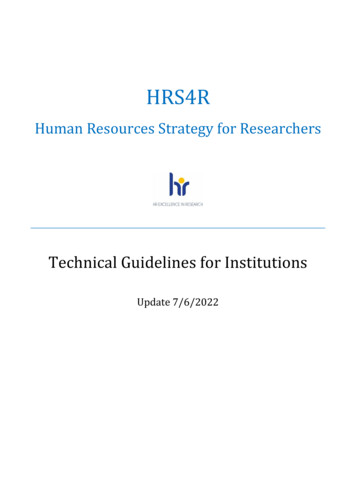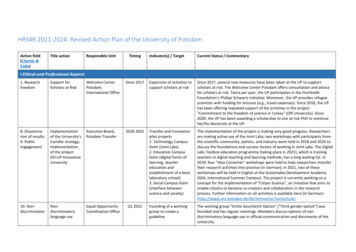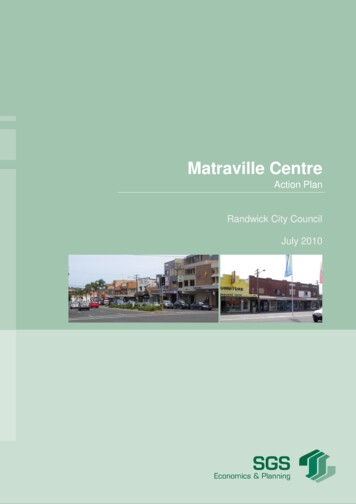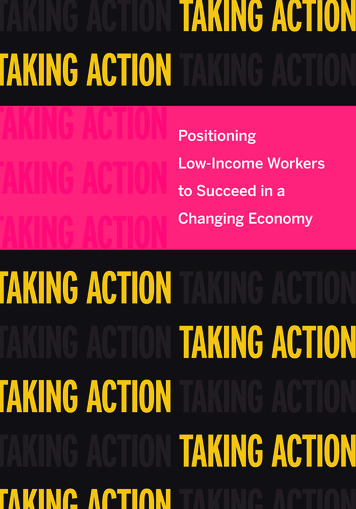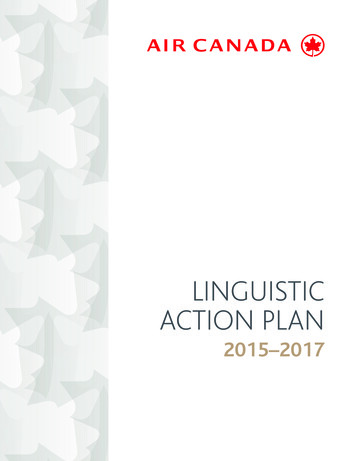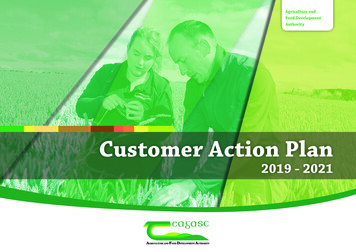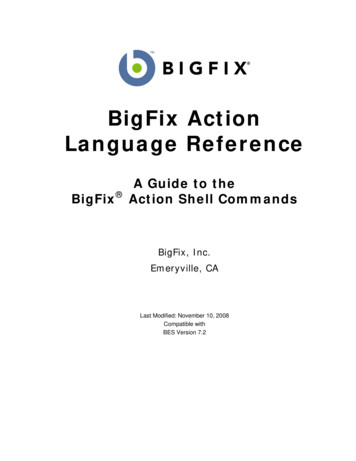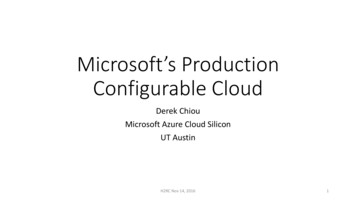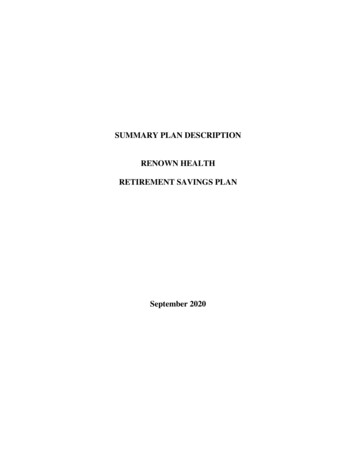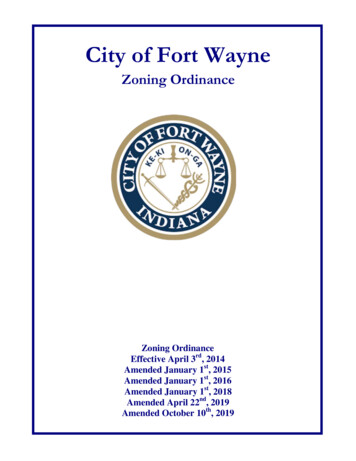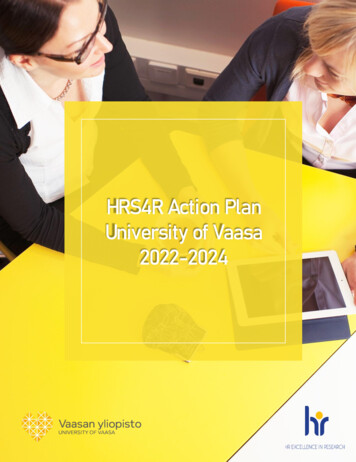
Transcription
HRS4R Action PlanUniversity of Vaasa2022-2024
We at the University of Vaasa recognize that our strength and success almost exclusivelydepend on the work contribution of our staff. All our results are directly based on the inputof our skilled and committed researchers and teachers and the experts working in theuniversity support functions. Therefore, we focus on the well-being of our staff anddeveloping the working environment.For us, working with the HRS4R process has been very rewarding. The European Charter forResearchers and the Code of Conduct for their Recruitment is a solid foundation fororganizational development and has helped us to identify our strengths as well asdevelopment areas. In addition to being an excellent tool for organizational development,the HRS4R development process will further enable us to create a working environmentthat is conducive to research, embraces diversity and supports the career development ofall staff members.Minna MartikainenVice-Rector for ResearchElina KaunismäkiHR Director
1 Ethical and Professional AspectsStrengthsIn terms of ethical and professional aspects and in addition to the principles of European Charter and Code forResearchers, the operations of the University of Vaasa (later referred to as “UVA”) are governed by Finnish andEuropean legislation as well as specific internally developed guidelines and decisions.UVA’s Equality Plan implements two Finnish acts: The Government Act on Equality between Women and Men(609/1986) and Non Discrimination Act (1325/2014). The first obligates the employer to ensure that women andmen have equal opportunities in terms of work, pay and professional development and the latter includes allprohibitions of discrimination apart from gender-based discrimination.An updated organizational Code of Conduct policy aims to clarify what it means to act in accordance with UVA’score values (Community, Courage, and Responsibility), to nurture the university as a responsible and ethicalcommunity and to ensure an internationally high level of research, education and teaching in accordance withethical principles and good scientific practice. The Code of Conduct applies to all members of the universitycommunity.UVA has also committed to abide by the ethical guidelines established by the National Advisory Board on ResearchEthics. Good Scientific Practice is an essential part of both teaching and research at the university. Informationabout what is considered as a violation of Good Scientific Practice as well as the relevant procedures are detailed inthe publication “Abiding by Good Scientific Practice”. The topic is also a part of the course offering to Doctoralstudents (good scientific conduct). UVA appointed an Ethics Committee in 2021, which gives statements on theethical and other risks research projects may have (implementing the guidelines on ethical principles based onFinnish National Board on Research Integrity TENK). The Research Council and University’s Ethics Committee willdraft a Code of Conduct for Research in 2022. Furthermore, services and guidelines for researchers on goodscientific conduct have been developed. Since November 2020 UVA also employs a dedicated Director ofSustainability and Ethics who heads up a team tasked with advancing and coordinating activities related tosustainable development and social responsibility, both in research and education.Considerable investments have been made to support the dissemination of research results and public engagementof researchers. In 2020, UVA formed a new Innovation and Commercialization team. The team helps researchers toexploit and commercialize innovations and research results as well as gives support in finding funding, advise onpatent applications and creates opportunities for collaboration between researchers and companies. UVA’sCommunications, Brand and Marketing department plays a key role in supporting researchers in communicatingtheir work to a wider audience by eg. offering training and guidelines in using social media, support for presentingin media interviews and writing press releases. They also help researchers in adding visibility through their profilepage on UVA’s website.WeaknessesAlthough UVA has established a unified language policy, in order to support the internationalization strategy, weneed to find even more solutions for truly integrating our international staff, especially taking into considerationthe participation in organizational working groups and decision-making bodies.Information on the principles of DORA – Declaration of the Responsible Assessment of Research – has been sharedon the UVA website and in meetings of the UVA Research Council. Acceptance of the declaration lacks finalapproval, but its principles have been incorporated into the ongoing Research Assessment Exercise 2021 –University of Vaasa.3
2 Recruitment and SelectionStrengthsA four-stage career model for teachers and researchers in academia is a common practice in Finland. The fourstage career model is also in line with the researcher career stages (R1-R4) as described in the EuropeanFramework for Research Careers (EU Commission, 2011).UVA considers a clear career model, including the tenure track model, as a key factor in promoting the stability aswell as predictability of research careers. A clear career model also ensures a transparent approach to recruitmentcriteria. As a result of a thorough development process, updated recruitment guidelines with a modified careermodel structure were published in October 2021.The University law and The General Collective Agreement and UVA’s regulations form the foundation of our careermodel guidelines. The guidelines define the eligibility requirements and criteria for all career stages. The evaluationof research takes into account the content of the researcher’s published production (e.g. research topics,methodologies and the significance of the results) and the quality as a whole. In addition to research, the eligibilitycriteria take into account merits in teaching, supervision, collaboration, societal impact, international activities aswell as activities within the academic community as required according to career stage.The principles of open, transparent and merit-based recruitment are an integral part of UVA's recruitment process.In the application stage, the applicants are recommended to use the templates found on the UVA website. In orderto ensure equal and fair evaluation of the applicant’s merits, the CV should be prepared in line with the FinnishNational Board on Research Integrity (TENK) template. The practices used in the selection process are connected tothe position to be filled. Practices such as interviews, teaching demonstrations, selection committees and expertassessments are commonly used.A key factor in maintaining and developing a thriving university sector in Finland, is to succeed in attracting andretaining international talents. In early 2020, during the previous HRS4R action plan period we conducted anextensive International HR Service design project, collecting and analysing data from our international employeesand other key actors who are involved at various stages of the recruitment process. The project highlighted themost well-functioning recruitment services as well as those in need of further development. According to thesurvey, the vast majority of respondents stated that they are satisfied with the recruitment, relocation andonboarding related services.WeaknessesOne of the main strategic aims of the UVA is to strengthen the profile as an internationally recognized research andinnovation university. We want to attract the best international talent, which the university as well as thesurrounding ecosystem so badly needs. Therefore, we will continue the employer branding work by furtherpromoting research and teaching careers and the working environment, including the OTM-R Policy.This also corresponds well with the national Ministry led initiative “Talent Boost”. There is a strategic roadmap,which outlines the steps to be taken in order to achieve this goal. However, some parts have been adverselyaffected by the current pandemic, e.g. the mobility of researchers. We have strong ambitions to attractinternational research talent to our university and area. For this purpose, we recognize the need for furtherdeveloping the cooperation with regional partners, such as the City of Vaasa. Although we can attract top talent tothe UVA and the surrounding region, we want to ensure that we can also retain them by offering services as aregion that also support the integration of not only the researchers but also their families. This is an essential partof our new action plan.4
3 Working ConditionsStrengthsDeveloping work, working conditions and communality as well as well-being at work as a whole is important to UVAas an employer. UVA invests in the well-being of its personnel in many ways, for instance by offering preventiveoccupational health care as well as extensive medical care, activities supporting physical and mental well-being aswell as flexible working time arrangements contributing to work-life balance.A workplace well-being survey is conducted every two years. The results from the survey are widely used inplanning and implementing unit-specific and university-level well-being actions. The last workplace well-beingsurvey was carried out in autumn 2021. The results show that workplace well-being at UVA is at a good level.Especially supervisory / managerial work and opportunities to utilize one’s own competence are strengths in ouruniversity. Further, the work tasks are considered motivating and interesting. Overall, the university level resultsshow that especially early-stage researchers feel satisfied in their work.As part of an extensive campus development project, UVA is modernising workspaces to accommodate new ways ofworking (e.g. crossboundary team working, use of technology). The development work has been carried outtogether with the whole university personnel, and views of the academic community have been collected e.g. byorganising workshops and surveys.In Spring 2021, UVA initiated a project to organize information about its research infrastructure. The project aims tocompile a complete data set about the existing laboratories, software, databases, networks and services includingthe financial resources needed in supporting the research infrastructure in the future.As to the career development of our researchers, a systematic, internally-delivered late-career faculty developmentprogramme (Unilead) was established in 2020. In 2022 UVA aims to launch an additional programme to supportjunior scholars in ‘navigating’ their way through academia and to develop the needed competences for nextresearch career stage.UVA values mobility experience. It is not only valued in conjunction with recruitments, but is also a recognizedcomptence development method. Researcher mobility is also a step in the roadmap to strengthening theuniversity's international operations. Members of our university community visit, develop and work in scientificcommunities and companies around the world during different phases of their careers. Besides internationalmobility, promoting intersectoral mobility and cooperation between private and public sector will be furtherstrengthened in the next action plan period. In addition to the Innovation and Ecosystems Team, a dedicatedExternal Relations Director has been hired to assist in creating strategic partnerships, supporting university-industrycollaboration as well as the innovation and entrepreneurship activities of faculty and students.WeaknessesUVA has already early on recognized the importance of supporting the work-life balance of its employees. This hasbeen achieved by e.g. enabling flexible working hours and hybrid/remote working possibilities. Nevertheless,further development of structures that support worklife balance and combining family and work is one of the keyfocus areas in the HR strategic programme for 2021 – 2024. Also, the current Covid-pandemic has fronted us tofurther review our remote working policies and guidelines.According to the workplace well-being survey, work-time management and the ability to concentrate withoutexcessive disturbances and changes in the working environment are areas to follow-up on, especially when it comesto researchers on a more senior level. Also, further opportunities to influence the university’s decision making arecalled for. From an HRS4R perspective, we want to promote researchers’ awareness of the decision-makingprocesses and participation in the decision-making bodies in the next Action Plan. This will be on focus especially forthe part of our international research staff.5
4 Training and DevelopmentStrengthsThe Research Services and Graduate school organizes events and training, as well as provides services for thewhole university community. The areas of expertise include e.g. research ethics, good scientific practice, researchpermits, ethical review process, open science, applying for research funding as well as contracts and agreements.They also support supervisors by providing relevant information and organizing events and training.UVA is a member of several national and international doctoral education networks, which offer high-qualitycourses for doctoral students. On an international level, UVA is a member of the European Institute for AdvancedStudies in Management EIASM. In addition, UVA and its Doctoral Programmes are members of EDAMBA –‘European Doctoral programs Association in Management & Business Administration’, which involves an externalevaluation of our curricula and quality assurance processes.In recent years, there has been an increasing emphasis on doctoral graduates’ working life competencies in orderto facilitate their placement in industry as well as in academia. UVA has participated in the national, EU fundedTOHTOS project that aimed to develop connections between doctoral education and work life networks.Through the services of CSC–IT Center for Science *, UVA researchers get regular information about training andcourses that help them enhance their digital skills e.g. in data management, sharing and publishing data, andcomputing. The recently appointed Data Manager also helps the researchers to use the open data archives andhelps to make their data openly available.Development discussions concerning the employee’s work, work situation, competence and career developmentare held annually. In conjunction with the development discussion, the supervisor and employee also prepare along-term plan, which includes target setting and staff training.As per the previous HRS4R action plan, UVA has now adopted a unified language policy, in order to support itsinternationalization strategy. According to law, the administrative language of UVA remains Finnish. However, allinternal communication is carried out both in Finnish and English. Professional language courses in Finnish forinternational staff as well as English language courses for Finnish staff are regularly provided.In addition to in-house training and events, staff are involved in a wide variety of national and international trainingand development events incl conferences and seminars.WeaknessesThe recent pandemic has had a major impact on the way we deliver our competence development activities. Wehave identified a need for a wider and more systematic offering of e-learning and hybrid learning opportunities.This also raises the need for a learning platform as well as learning management system for staff training, whichwould support e-learning and enable more systematic follow-up of the quantity and quality of the training.One of the development areas in the next action plan period is to further develop support structures forsupervisors for the Doctoral students. Other development needs include harmonizing and strengthening the coredoctoral programme curricula as well as closer integration of Graduate School training modules with industry andworking life to improve impact, engagement and employability.Pedagogical education of the teaching faculty has already increased significantly. Nevertheless, UVA is respondingto changing educational needs through a comprehensive renewal of our learning environment (campusdevelopment project). In addition, the development of the pedagogical, and especially digi-pedagogicalcompetences will be one of the main key strategic development areas for the coming years.6
Selected Actions toimplementation in thenext HRS4R cycle2022-2024
Actions1.Developing the research infrastructure2.Improvements to commercialization of institutionalpartnerships and research funding services3.Developing evaluation practices in research4.Developing doctoral student and researcher education andtraining opportunities5.Support for doctoral thesis supervisors and strengtheningthe support structure for supervisors6.Developing project management services and support7.Creating and supporting internal (professional, academic)networking and information-sharing within the researchcommunity8.Campus renewal and renovation to create a modern workingenvironment and facilities conducive to research9.Flexible working arrangements and hybrid work10.Integration of international staff11.E-learning and hybrid learning opportunities12.OTM-R: Quality control system13.OTM-R: Raising internal awareness of UVA career structureand development opportunities
1. Developing the research infrastructureAction GAPPrinciple(s)TimingMapping out the research infrastructure, reporting and follow-uppractices, utilization and marketing it to external partnersTo have a clear vision of the infrastructure and the investments as well asinputs/outputs23. Research environment24. Working conditionsQ4/2020 - an ongoing development themeResponsibleUnitResearch Services, ongoing development Finance and Project Managementunit, responsible for statistics and reportingResponsible persons of the laboratories, academic units and researchplatformsIndicatorsA complete data set about the existing laboratories, software, databases,networks and services including the financial resources needed in supportingthe research infrastructure in the future.Current StatusRemarksIn progressUVA initiated a project in spring 2021 for organizing information about itsresearch infrastructure. The project aims to compile a complete data set aboutthe existing laboratories, software, databases, networks and services includingthe financial resources needed in supporting the research infrastructure in thefuture.
2. Improvements to commercialization of institutional partnerships andresearch funding leUnitIndicatorsCurrent StatusRemarksRaise external funds via state-backed fundraising campaign 2020-2022Strengthen strategic partnerships with key stakeholders that contribute toexternal funding of university’s activities.Continuously improve quality of research service provision across researchproject lifecycle via process improvement and 1-2 new hires specializing inEU funding.8. Dissemination, exploitation of results9. Public engagement23. Research environment26. Funding and salariesQ4/2020 - Q4/2022A.B.C.Working group for the fundraising campaignInnovations and Ecosystems -team with the academic unitsPartly Research Services with the academic unitsA.B.C.Success of the fundraising campaignNumber and quality of external partnershipsCustomer/researcher feedback concerning research project lifecyclemanagement Success in EU funded project applicationsIn progress
3. Developing evaluation practices in researchA.ActionB.GAPPrinciple(s)Timing6. Accountability7. Good practice in research11. Evaluation/appraisal systems23. Research environmentQ2/2021 - Q4/2022 – an ongoing development themeA.ResponsibleUnitB.IndicatorsCurrent StatusRemarksExecuting the Research Assessment Exercise (RAE): providing data on thequality of the research and research environment; developing practicesand tools for regular monitoring and assessment.Developing evaluation and indicators of societal impacts of research andpractices of reporting Research Evaluation project: Research Services, ongoing development alsoFinance and Project Management unit, responsible for statistics andreportingInternal accreditation actors in collaboration with (Innolab) researchersRAE reports and drafting a plan for ongoing developmentAnnual Researcher Survey on research environment resultsIn progressEvaluation practices in research: continuous self-reflection and availability ofdata. In following good evaluation practices in research, the ongoing thirdresearch evaluation outlines a way towards a model for regular monitoring andassessment of the research activities and environment. This will increaseavailability and validity of evaluation data and foster continuous self-reflectionon research activities and implementation of research strategy.The ELVIS project of the InnoLab research platform is developingcomprehensive approaches and indicators for impact evaluation that willsupport accountability of research practice and validity in assessing societalimpacts of research.
4. Developing doctoral student and researcher education and s)TimingResponsibleUnit1. Research freedom2. Ethical principles3. Professional responsibility7. Good practice in research8. Dissemination, exploitation of results38. Continuing Professional Development39. Access to research training and continuous developmentQ1/2022 – Q4/2024A.B.C.D.E. IndicatorsCurrent StatusRemarksHarmonizing and strengthening the doctoral programmes and the internalmanagement practicesDeveloping e.g. the university-industry collaboration modelTraining modules with industry and working life.Designing and implementing the Accelerate -training programme for earlyand mid-career faculty (R2-R3 stage researchers)Developing the digital competences of researchers: Dissemination ofresearch data, communication skills, pedagogical skills Graduate School in cooperation with the Academic unitsInnovations and Ecosystems teamInnovations and Ecosystem teamAccelerate working group: process management HR, programme contentAcademic UnitsCoordinated by Research Services, input from various internal serviceprovidersNumber of courses, trainings and events, participants and participantfeedback Regularly gathered feedback from researchers (Researcher Survey)Number and quality of partnerships and collaborative training modules toimprove societal impact, engagement and employabilityIn progressGraduate school courses are open to all personnel.Research Services on their services and expert areas: Providing services,support, information and training on research ethics, good scientific practice,research permits, ethical review process, open science, applying researchfunding, drafting an award-winning research funding application, budgeting ofthe research process, contracts and agreements, reporting the scientificpublications and actions
5. Support for doctoral thesis supervisors and strengthening thesupport structure for supervisorsAction ent StatusRemarksProviding supervisors with required information, organizing training eventsand discussion forums for knowledge/experience sharing.Updating and streamlining the guidelines and recommendations on thesupervision processes.40. SupervisionStarted 2021, ongoing until Q4/2023Graduate School with the academic units Number of trainings and events, number of participants, training feedbackCompleted revised guidelines and recommendationsIn progress
6. Developing project management services and supportTo continuously improve quality of research service provision across researchproject lifecycle via process improvement atorsCurrent StatusRemarksA.Developing the services and support for project management on allareas of services: service organization, work division, processes, rolesand responsibilitiesB.New project management tool23. Research environment24. Working conditionsQ4/2019 - Q4/2023 as an ongoing development themeA.B.All University services (within their own expertise areas) with the academicunitsFinance and project administration services Regularly gathered feedback from researchers (Researcher Survey)New project management tool in useIn progress
7. Creating and supporting internal (professional, academic) networking andinformation-sharing within the research tIndicatorsCurrent StatusRemarks Maintaining and developing the Research Café -concept, which bringstogether cross-disciplinary teams Increase communality, enhance information sharing and co-creation withinthe research community8. Dissemination, exploitation of results23. Research environment24. Working conditions28. Career developmentQ1/2022 – Q/4/2024Innovations and Ecosystems team, Research services Number of Research Café events organized, number of participantsRegularly gathered feedback from researchers (Researcher Survey)Extented
8. Campus renewal and renovation to create a modern workingenvironment and facilities conducive to research Action ent StatusRemarksModernizing workspaces to accommodate new ways of working (e.g.cross-boundary team working), creation of a thriving campus communityfor faculty, students and partnersModernizing teaching and learning spaces to further support the use oftechnology in teaching, improve energy efficiency as part of a greener andcarbon neutral campus23. Research environment24. Working conditions32. Co-authorshipOngoing, envisioned completion Q4/2024Campus Development Group and the Director of FinanceCompletion of the several sub-projects according to scheduleExtendedThe way of organizing the Campus Development and the major milestones ofthe project are described in detail in the document “Campus DevelopmentOrganization”.
9. Flexible working arrangements and hybrid workActionRevising guidelines for different personnel groups regarding:A. hybrid work (incl remote work)B. international assignments (research exchanges, secondments abroad)The guidelines will be further developed allowing more flexibility and taking int oaccount the nature of work. The guidelines will be clearly instructed within theuniversity catorsCurrent StatusRemarks18. Recognition of mobility experience (Code)23. Research environment24. Working conditions29. Value of mobilityQ1/2022 - Q4/2022Guidelines are approved by the Rector. Preparatory work:A. HR, Legal counselB. HR, Financial, travel and project coordination services renewed guidelines existnumber of staff information/training sessionsexisting instructions within the internal community (intranet)NewThe revised guidelines will be prepared in cooperation with various personnelgroups and stakeholders. In parts, the work has started. Special attention will bepaid to internal communication of the revised policies. Concerning remote workabroad, the University is mapping the possibility to enable flexible remote workalso abroad to the extent that it is legally possible and considering safetyguidelines and insurance requirements.
10. Integration of international staffA.B.ActionC.GAPPrinciple(s)Re-evaluating the University’s language policyIncreasing awareness of the organizational structure, working groupsand decision making bodies of the university. Enabling participation anddeveloping way-of-working.Developing the recruitment process further with particular attention tointernational recruitment and required support services (eg. Spouseprogramme)12. Recruitment13. Recruitment (Code)23. Research environment24. Working conditions35. Participation in decision-making bodiesTimingResponsibleUnitA.B.IndicatorsCurrent StatusRemarksC.NewUpdated language policy existsDiversity in decision making bodies (how many non-Finnish staff memberscompared t o current situation)Survey (follow-up of the 2020 international service design project), numberof events promoting integration to the university community/Finnishsociety, existing spouse support programme
11. E-learning and hybrid learning opportunitiesActionA. Digitalisation of the induction process. In the following action plan period,the digital induction material and related on-line sessions will be furtherelaborated. The focus will first be on digital induction for those who are new intheir managerial position and the international staff community. Thedevelopment work will partly be a joint effort with other Finnish highereducation institutions.B. Offering wider and more systematic e-learning and hybrid learningopportunities. Adopting a learning management system for personnel training,which would enable more systematic follow-up of the quantity and quality ofthe training.GAPPrinciple(s)TimingResponsibleUnit12. Recruitment37. Supervision and managerial duties38. Continuing professional development39. Access to research training and continuous developmentQ2/2022 - Q2/2023A.B.HR in cooperation with selected internal process ownersHRA.The introductory learning paths for the international staff community andthose who are new in their managerial position exists and is openlyavailableThe digital platform is adopted and accessible, feedback from end usersIndicatorsB.Current StatusRemarksNewThe Induction Programme of the University of Vaasa consists of 5 differentmodules. Previously, the programme has been held on-campus only. The pasttwo induction programme rounds (during the pandemic) were held on-line andrecorded. The recordings have been saved to the intranet and are freelyavailable for staff members.
12. OTM-R: Quality control systemActionGAPPrinciple(s)Timin
courses for doctoral students. On an international level, UVA is a member of the European Institute for Advanced Studies in Management EIASM. In addition, UVA and its Doctoral Programmes are members of EDAMBA - 'EuropeanDoctoral programs Association in Management & Business Administration',which involves an external
